A Century’s Search for Great American Authors
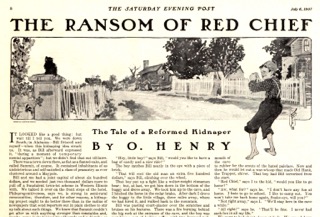
With the publication of the Best Short Stories of the Great American Fiction Contest 2016, featuring winner Celeste McMaster’s “Zelda, Burning”, the Post continues a century-long tradition of discovering new literary talent.
Ever since its earliest years, when it published works by Hawthorne, Irving, and Poe, the magazine was associated with great American fiction. But starting in 1899, it developed a reputation as the most prestigious magazine for writers to publish their stories in. Any struggling author whose story appeared in its pages, particularly in the 1920s and 1930s, could feel that he or she had arrived.
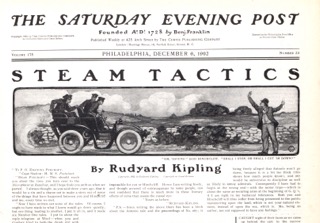
The man who built this reputation for the Post was George Horace Lorimer, an editor with a strong sense of what American readers wanted. In the 1900s, he paid top dollar for stories by the best authors of his time: Stephen Crane, O. Henry, and Joseph Conrad. And he turned down work by famous writers that he felt didn’t come up to the Post standards. He rejected 12 stories by Rudyard Kipling (who was living in America while writing The Jungle Book) before finding one he liked.
But Lorimer’s genius extended beyond recognizing quality from the big names in fiction. He purposely sought stories from promising unknowns. He scoured newspapers, looking for their work. He advertised in the Post, assuring writers that “good short stories bring good prices. The Post will pay well for cleverly written, unpublished stories from 3,000 to 5,000 words.”
Lorimer also regularly dug into the pile of unsolicited stories sent to the Post. Each year, the magazine received more than 175,000 manuscripts from authors hoping to hit the big time. Among Lorimer’s discoveries was a then-unknown author named Sinclair Lewis. In 1915, his “Nature, Inc.” — a satire about a pseudo-religious health farm — landed in the Post’s slush pile. Lorimer found the manuscript, read it, and immediately wrote to Sinclair: “‘Nature, Inc.’ is an exceedingly entertaining short story, and we are very glad to have it for The Saturday Evening Post. Now that you have made a start with us, I hope that you will … become a household word.”
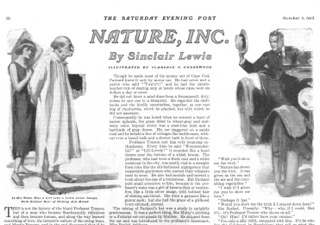
Over the next five years, Lewis published 28 stories and articles in the Post. His last piece in the magazine was published five years after Lewis became the first American author to receive the Nobel Prize in literature.
Another Lorimer discovery was F. Scott Fitzgerald whose short stories were selected for publication before his first book, This Side of Paradise, hit bookstores. Years later, Fitzgerald recalled his excitement when he got the news the Post had accepted his work: “I’d like to get a thrill like that again, but I suppose it’s only once in a lifetime.”
In the 1950s, the Post published several stories written by a young publicist at General Electric named Kurt Vonnegut. Of the 11 stories that appeared in the Post, most were written before Vonnegut developed his signature style. But if you read his seventh story, “Miss Temptation,” you’ll definitely recognize notes of his distinctive literary voice.
The Post also played a role in boosting the career of Ray Bradbury. When the Post published “The World the Children Made” in 1950, it was the first time Bradbury’s fantasy writing appeared in anything other than a pulp magazine. The Post published 16 of Bradbury’s stories over the next 62 years, the last appearing in 2012.
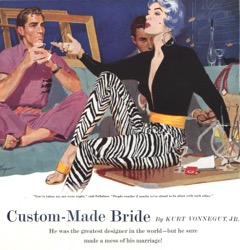
In the 1940s, a Jerome David Salinger submitted several stories to the Post. By the time his first story appeared in the magazine, Salinger had been drafted, sent overseas, and participated in the D-Day invasion. He was thrilled to hear that “The Varioni Brothers” would appear in the Post. “My God,” he wrote one of his old writing teachers, “the millions of people who’ll read them. Can you imagine?”
Shortly after his fifth story appeared in the Post — “The Last Day of the Last Furlough”— he was among the first American troops to enter liberated Paris. When he bumped into Ernest Hemingway, then serving as a war correspondent, Salinger hunted up a copy of the Post and took it to Hemingway, asking him for his opinion. After reading the story, Hemingway declared Salinger “a helluva talent.”
The name Ernest Hemingway reminds us that the Post didn’t publish every great American writer of the 20th century. We might have published Jack London, Edith Wharton, William Faulkner, John Steinbeck, Truman Capote, Thomas Pynchon, Zora Neale Hurston, Carson McCullers, Pearl Buck, James M. Cain, Shirley Jackson, Tom Wolfe, John Cheever, and John Updike — but we never published any Hemingway.
Though we can’t be certain that he ever submitted anything to the Post.
Don’t miss your chance to join this group of great American authors. Make sure the Post receives your entry to the Great American Fiction Contest before the July 1, 2016, deadline.
Meet the 2016 Great American Fiction Contest Prize Winners
We’re pleased to announce Celeste McMaster the winner of our 2016 Great American Fiction Contest! Read her prize-winning story “Zelda, Burning” and the stories from our five runners-up below.
Meet the Winner!

Celeste McMaster
“I screamed and stomped around so much my husband thought I’d seen a mouse,” says McMaster on learning “Zelda, Burning” took first place in the 2016 Great American Fiction Contest, winning publication in the Post and online, and a prize of $500.
The story evolved over an eight-year period. “My American literature professor suggested I write on Zelda Fitzgerald, so she planted the seed, but I didn’t follow her advice until I went to graduate school,” she says. “I started the story in a creative writing class imagining what Zelda must have felt in her last years.”
After completing her Ph.D., McMaster took a position as English professor at Charleston Southern University. Attending the Appalachian Writers Workshop, she returned home and felt “reinvigorated to revise the story.”
“Zelda, Burning” revolves around actual historic events. “It is true that Zelda died in a fire in the Highland Mental Hospital in Asheville, North Carolina, and that she danced, painted, and wrote,” says the author. “But I took creative liberties as to Scott and others haunting her while she was in the hospital.”
Guest judge and author Michael Knight found the winning entry a beautifully written account of Zelda’s time in the mental institution and her troubled romance with F. Scott Fitzgerald: “Scene by scene, line by lovely line, Celeste McMasters breathes life into a version of Zelda Fitzgerald that is as complex and compelling as you will find.”
“Zelda, Burning” is McMaster’s first story for a national magazine, though she has published in literary journals, including New Delta Review, Dos Passos Review, and Arkansas Review.
Meet the Runners-Up!
Each runner-up receives $100 and publication of his or her work on our website. (To read the prize-winning stories, click the titles or images below.) We salute these fine writers and the more than 330 others who entered our 2016 contest.
Ruth Knafo Setton
Title: “The Magic Circle”
Story Line: On a fall night in 1963, a young immigrant struggles to support his family and hold on to a dream.
Bio: Published essays and stories in The Jerusalem Post, Literary Traveler, and North American Review, as well as a novel, The Road to Fez (2011).
Marlene Olin
Title: “A Ring, Some Pearls, Perhaps a Watch”
Story Line: Where was the boy nobody played with, and what did he see?
Bio: Published stories in Edge, The Maine Review, among other literary journals, as well as in the Post‘s online series #NewFictionFriday.
Jake Teeny
Title: “Welcoming Death”
Story Line: Was Perry really face to face with Death, or was it all just an elaborate dream?
Bio: First short story published by a national consumer publication; short stories published in Easy Street, Gemini, and other literary magazines.
Eileen M. Hopsicker
Title: “Five in the Fifth”
Story Line: Working at the Evergreen Nursing Home, young Jerry Keller didn’t think much about the future until he met Millie.
Bio: First short story published by a national consumer publication; first novel The Balance of Justice will be released in spring 2017.
Jim Gray
Title: “A Short Ride to Mercy”
Story Line: Sam didn’t become his dog until Marlene left. The older they got, the more they depended on each other — more so than ever.
Bio: Published mysteries in Woman’s World magazine, as well as stories in leterary magazines; runner-up in 2015 Great American Fiction Contest.
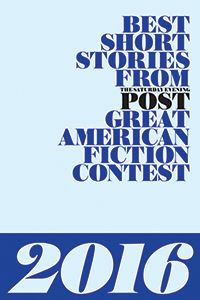
Read ’Em All
Post editors are delighted by the amazing storytelling and fine writing of this year’s entrants. We’ve compiled 30 of the best stories — our winner, runners-up, and semifinalists — in an e-book, available on your favorite platforms for $3.99. Order now at saturdayeveningpost.com/fiction-books.
Meet the 2015 Great American Fiction Contest Prize Winners
We’re pleased to announce N. West Moss the winner of our 2015 Great American Fiction Contest! Read her prize-winning story “Omeer’s Mangoes” and the stories from our five runners-up below.
Winner
Runners-Up
Click here to purchase the collection, which includes 21 additional stories not available online.
Enter The Saturday Evening Post 2016 Great American Fiction Contest; click here.
Meet the Winner!

N. West Moss
“Am I dreaming?” asked Moss when notified her story “Omeer’s Mangoes” had won first place, publication in print and online, and a prize of $500. “I am thrilled beyond belief to be in a publication I hold in such high esteem.”
Her vividly written story drew inspiration from real-life events. “My father died last year, and about a month later, my mother and I went to New York City to visit the apartment that my parents kept for 30 years,” says Moss. “It sits right across the street from Bryant Park. When we got there, the doorman — also there for 30 years — greeted us, took my mother’s hand and asked, ‘How is Mr. Moss?’ Informed my father had died, the doorman froze, then turned to the wall and wept. His sobbing in the corner of the lobby over my father’s death was the spark for ‘Omeer’s Mangoes.’
“‘Omeer’s Mangoes’ is my first piece of fiction to reach a national audience,” says Moss. “The New York Times published an essay back in 2008, and that was exciting and unexpected. But this is exciting in a completely different way. Having people read my fiction feels much more vulnerable because it is entirely mine in a way that nonfiction skirts.”
After graduating with her MFA from William Paterson University in 2013 at age 49, Moss took a year off to write full-time —“5 to 10 hours each day.” She has won several awards — the Faulkner-Wisdom Award and Diana Woods Memorial Award for Creative Nonfiction — for her work, which has appeared primarily in literary journals, including The Westchester Review, The Blotter, and Hospital Drive.
Meet the Runners-Up
Each runner-up receives $100 and publication of his or her work on our website. (To read the prize-winning stories, click the titles below.) We salute these fine writers and the more than 200 others who entered our 2015 contest.

Sarah Gerard
Title: “Sideshow”
Story Line: On a trip to Coney Island, an alienated father and son renew their bond.
Bio: First short story published by national consumer publication; Gerard’s first novel Binary Star publishes on January 13, 2015 (Two Dollar Radio Press).

Jim Gray
Title: “Nothing but the Truth”
Story Line:An uncle returns from WWII
a changed man. Some injuries you simply can’t see.
Bio: Published mysteries in Woman’s World magazine; published stories in literary magazines.

Mathieu Cailler
Title: “Party of Two”
Story Line:When a world-weary, middle-aged couple witnesses a young pair kissing in a restaurant booth, it stirs memories of first love and lost love.
Bio:Published story in Post’s online series New Fiction Friday; first short-story collection, Loss Angeles, due out in February 2015 (Short Story America Press).

Lisa Trank
Title: “1939 Plymouth, or The Bootlegger’s Driver”
Story Line: Immigrant Lüdvik Lendle loves America, a country where anything is possible. But on a road trip across America, he wonders what he has gotten himself into.
Bio: First short story published by national consumer publication; currently working on first young adult novel, Tangled Chimes.

Myrna West
Title: “The Three of Us”
Story Line: Laurie thought she knew everything about Paula, the brilliant and beautiful ex-wife of her fiancé, John.
Bio: First short story published by national consumer publication.




